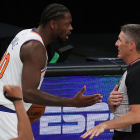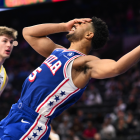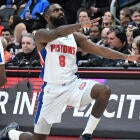
The New York Knicks almost won a game they had no business winning on Monday night. With 28.6 seconds to play, they trailed the Brooklyn Nets 115-108. A pair of buckets, a successful review and two jump-balls later, the Knicks found themselves in possession trailing by three points with 5.7 seconds to play.
That's when Julius Randle was called for traveling on this play:
Randle was heated after being called for the travel to end the game 😳 pic.twitter.com/azDJ8BLgoy
— Bleacher Report (@BleacherReport) March 16, 2021
We'll get into the nuances of referee Scott Foster's postgame explanation of this call, but the basics are this: If you go in the air with the ball in your hands, you can't come back down with it still in your hands. That's traveling. Randle argued that because Kyrie Irving, his defender, made contact with the ball, it should've essentially been deemed a new possession from that point forward. He did not get his way, and after the final buzzer sounded on New York's 117-112 defeat, Randle let his frustrations be known as his teammates restrained him from officials before he tossed a chair on his way off the court.
Randle chose not to comment on the call in his postgame interviews, telling reporters: "I just think it's best I move past it and not comment on what I think." Scott Foster, the crew chief who made the call, did elaborate on the ruling. Via ESPN's Malika Andrews, Foster's explanation is below.
Here is crew chief Scott Foster — who was refereeing tonight’s Knicks/Nets game in Barclays Center — on the travel call on Julius Randle: pic.twitter.com/Z2VLJmlQMP
— Malika Andrews (@malika_andrews) March 16, 2021
This explanation lines up with the video. Watch it again, and you'll clearly see that while Irving does indeed touch the ball, it does not become "dislodged or loose." If you've never heard the word alights (I had to look it up myself), it means to descend. In other words, Randle, once he leaves his feet, cannot come down with the ball still in his hands.
As Foster further explained, even if Randle had lost control of the ball while in the air, he couldn't have been the first one to touch it upon returning to the ground, nor is he allowed to dribble, which is after the fact but you can see he also did. On Tuesday, the NBA issued their Last Two Minute Report which confirmed that Foster made the correct call.
"As Randle (NYK) jumps into the air, Irving (BKN) makes contact with the ball, but does not dislodge it and does not cause Randle to return to the floor with possession. Therefore Randle must pass or shoot before returning to the floor. Since he does return to the floor with the ball still in his possession, this is a traveling violation."
What's interesting is if you look closely, it appears that Irving touched the ball before Randle left his feet. It doesn't make a difference because Randle, without the ball being dislodged, still chose to elevate, and from there he can't come back down with possession. But had he had the wherewithal to let go of the ball in a manner that didn't look to be on purpose, and had the play been reviewed, you have to wonder if perhaps Foster's call could've been overturned on account of it basically being a regular strip, before Randle elevated. Had the call been overturned on those grounds, it would've resulted in a third jump ball in the final 30 seconds, and who knows how that would've played out.
Having said that, the Knicks didn't have any challenges left having used their final timeout prior to that possession, and again, Randle never lost control of the ball anyway. He went up with it, so he can't come back down with it. Foster's explanation makes sense and the Last Two Minute Report confirmed that for us on Tuesday.
![[object Object] Logo](https://sportshub.cbsistatic.com/i/2020/04/22/e9ceb731-8b3f-4c60-98fe-090ab66a2997/screen-shot-2020-04-22-at-11-04-56-am.png)



















